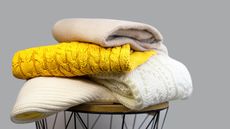Home office storage ideas – 10 ways to store in a home study
These home office storage ideas will keep your room orderly and chic and your hours productive
- (opens in new tab)
- (opens in new tab)
- (opens in new tab)
- Sign up to our newsletter Newsletter


Home office storage ideas have some important criteria to meet. The room’s storage needs to be capacious enough for now, as well as anticipated future needs; make everything easy to find; and it must contribute to the room’s aesthetic.
Fail to make the grade on any of these measures and it can result in a space that’s cluttered, shortens productive hours, and looks more corporate than stylish. In other words, whether there are many documents, and much reference material, office equipment, and more, or the requirements are more minimal, as part of your home office ideas, storage is key.
To fulfill your needs discover our favorite home office storage solutions as well as the advice of designers and professional organizers.
Home office storage ideas
The best home office storage ideas suit what you need to store and the aesthetic of your room. Consider both freestanding furniture and custom-built cabinetry and think, too, about whether your storage ideas should be open or closed, or include some of both types.
1. Use storage as decor
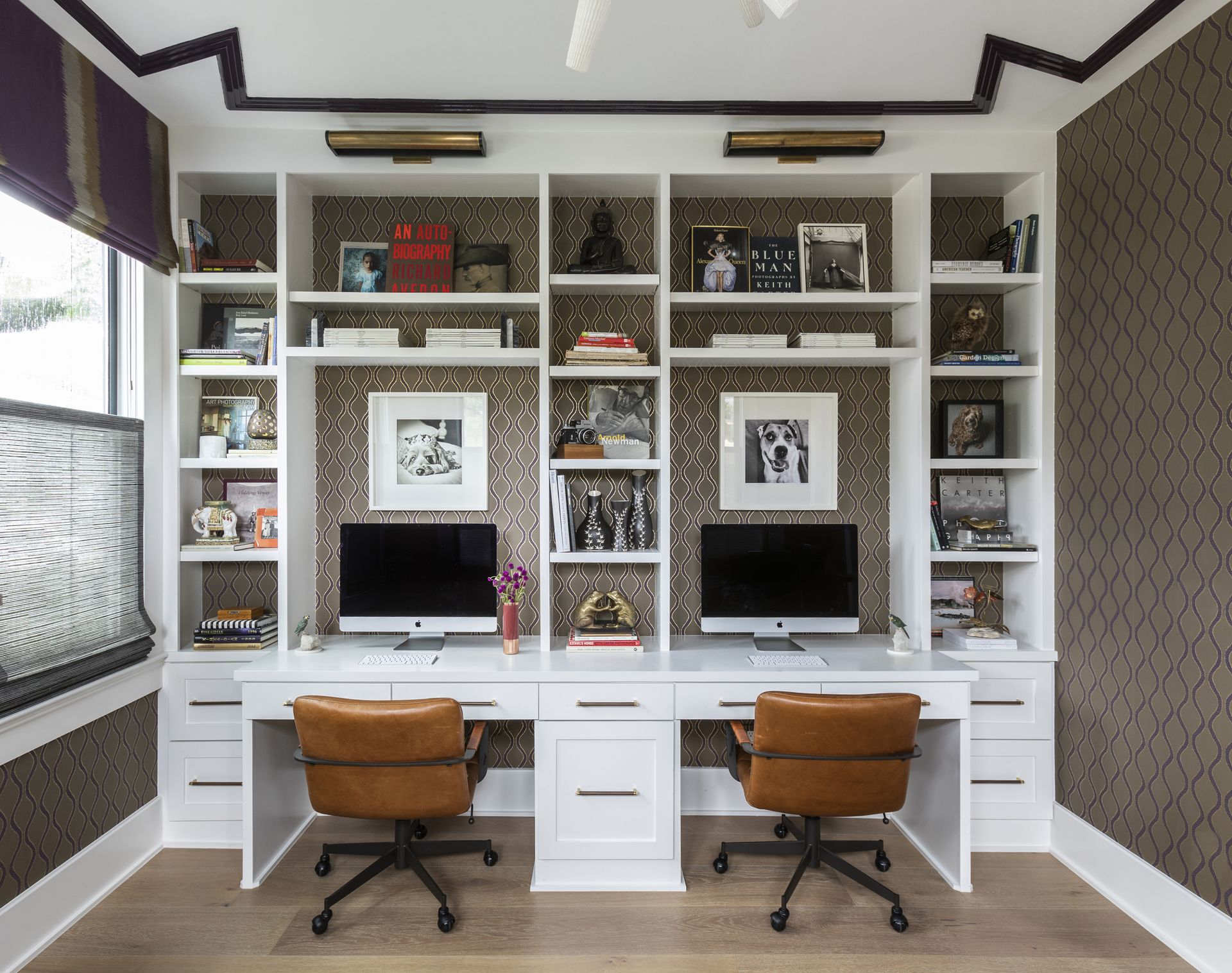
The home office storage ideas you select can be an attractive feature of the room at the same time as fulfilling their function – and this can include good-looking bookshelf ideas.
‘Using decorative boxes in the open shelves to store smaller items, such as photos, extra pens, or office supplies is a clever and visually appealing use of space – you get storage and decor all wrapped in one,’ says Courtnay Tartt Elias with Creative Tonic Design (opens in new tab).
‘In the same vein, I love to store flower vases in the open shelves of bookcases for a pop of color that feels fun and whimsical. Plus, when you need them for your latest arrangement of fresh blooms, they’re super easy to access.’
Choosing a stylish storage basket (or two) is also a great way to hide clutter in style. Whether on the floor or on a shelf. Match yours to the style of your home office for a seamless solution.
2. Make the most of space behind the desk
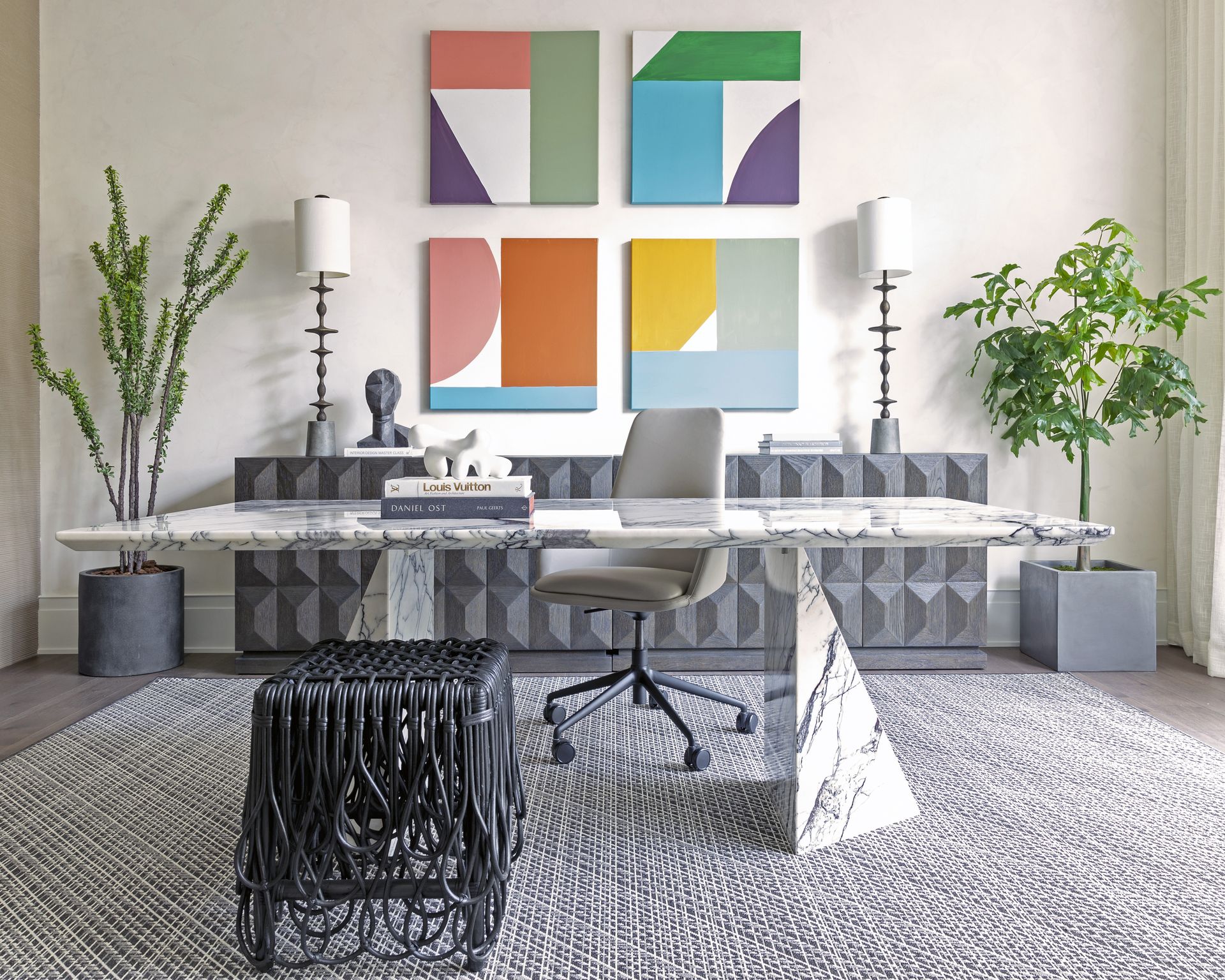
When planning your home office setup, bear in mind that the space behind a desk can be the ideal place to locate storage furniture, and a long low design can do double duty.
‘We like adding an additional area behind the desk to conceal and neatly tuck away unwanted items,’ explains Benjamin Johnston of Benjamin Johnston Design (opens in new tab). ‘Not only does this hide items you don’t want on display, but it can also act as an additional work area when the need arises.’
3. Opt for a storage wall
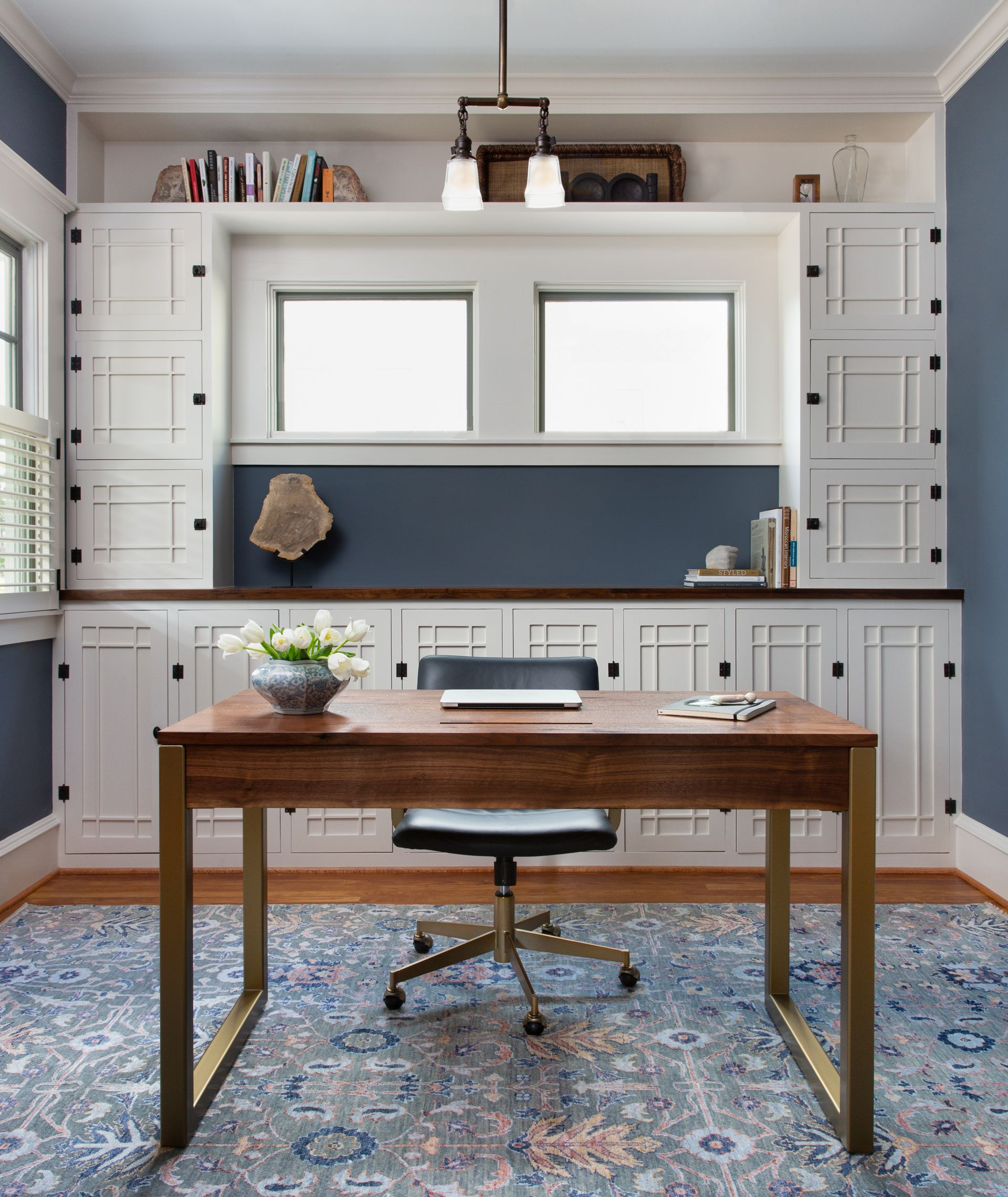
Keep a home office feeling spacious by opting to provide all the storage the room needs on a single wall. This is a particularly good solution for smaller rooms, avoiding the need to accommodate separate freestanding pieces, and can allow the desk to be positioned centrally.
Follow this room’s example with cabinetry with decorative detail that makes the storage a handsome feature.
4. Plan to hide tech away
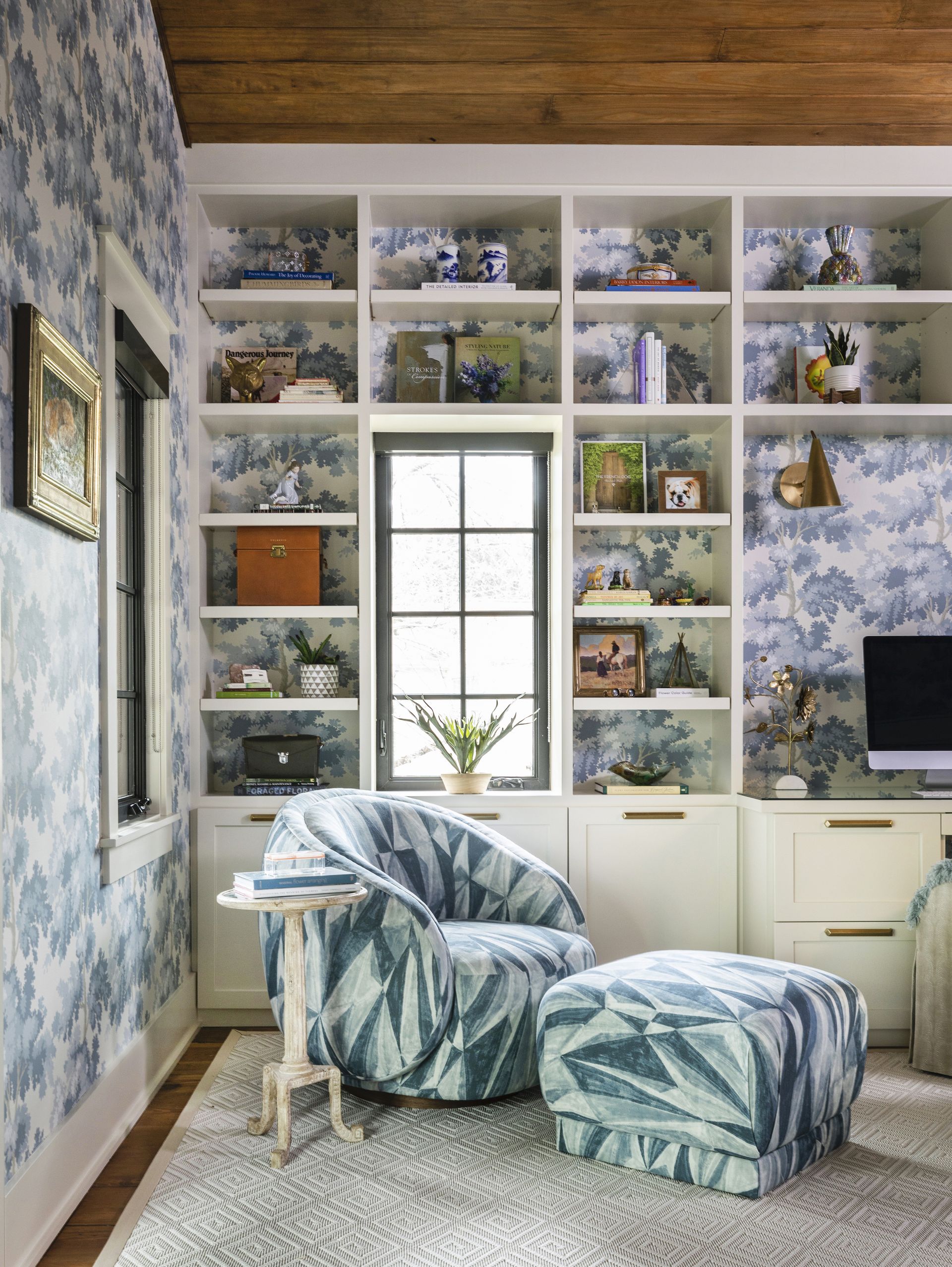
Consider items that are best concealed when deciding on home office storage ideas. ‘For the less attractive office items you need to store like printers, closed cabinets are ideal,’ says Courtnay Tartt Elias.
You might also want a custom solution for documents rather than freestanding furniture. ‘Building file cabinets into your bookcases is a lovely way to both increase the usable area of the desk above and ensure that all of the storage necessary for a functional home office is cohesive and beautiful,’ she says.
5. Take advantage of vertical space
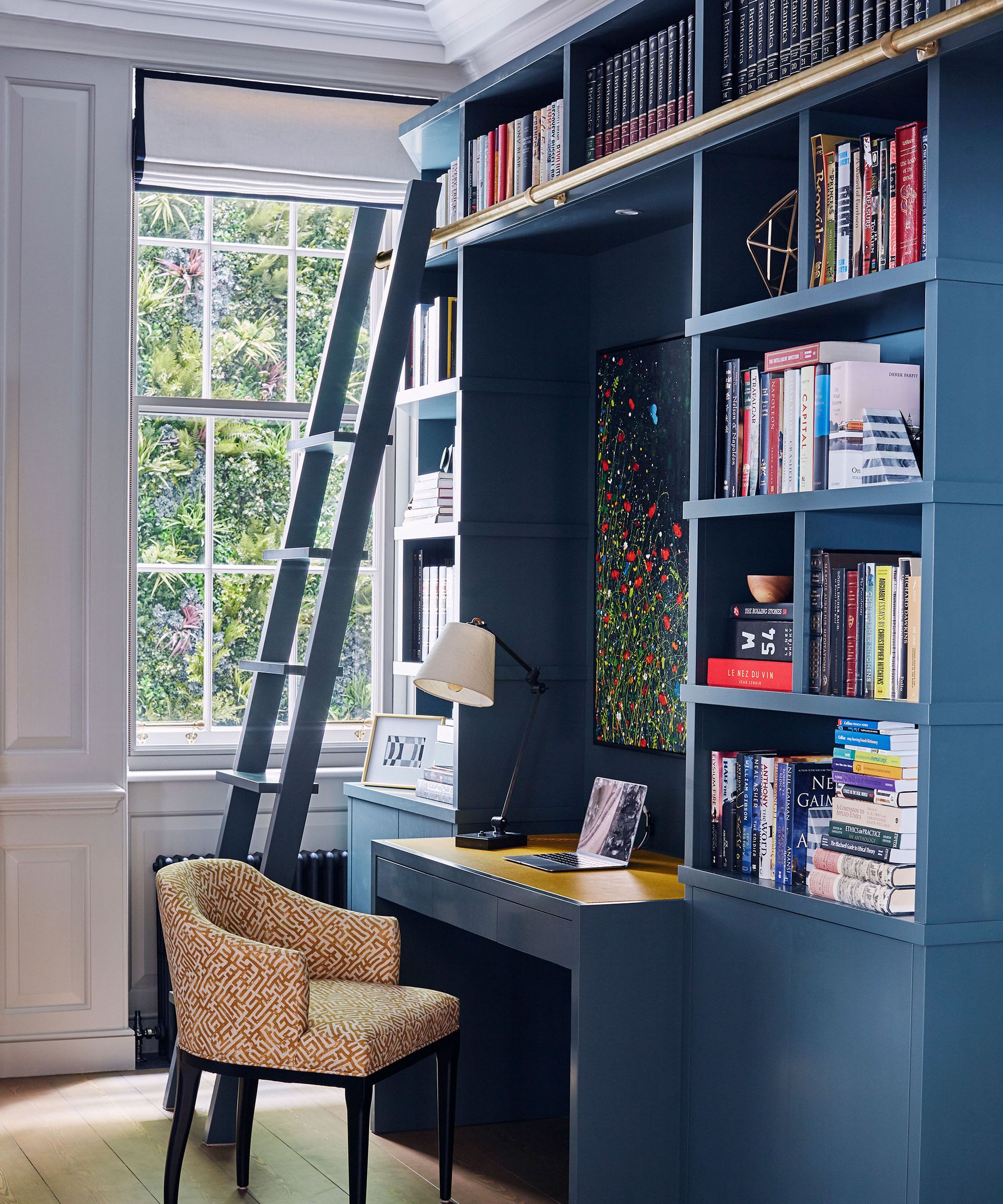
One of the best home office design tips that we can give is to use vertical space – and this is doubly important in a small home office.
A proportion of the items that are stored in a home office may be records that must be kept but are seldom accessed. For these, think about taking advantage of the room’s vertical space to maximize what can be kept there without making the room feel cluttered.
If the room has a high ceiling, a library ladder like this one allows easy retrieval of items when necessary and adds to the coziness of a book-lined office.
6. Categorize and contain
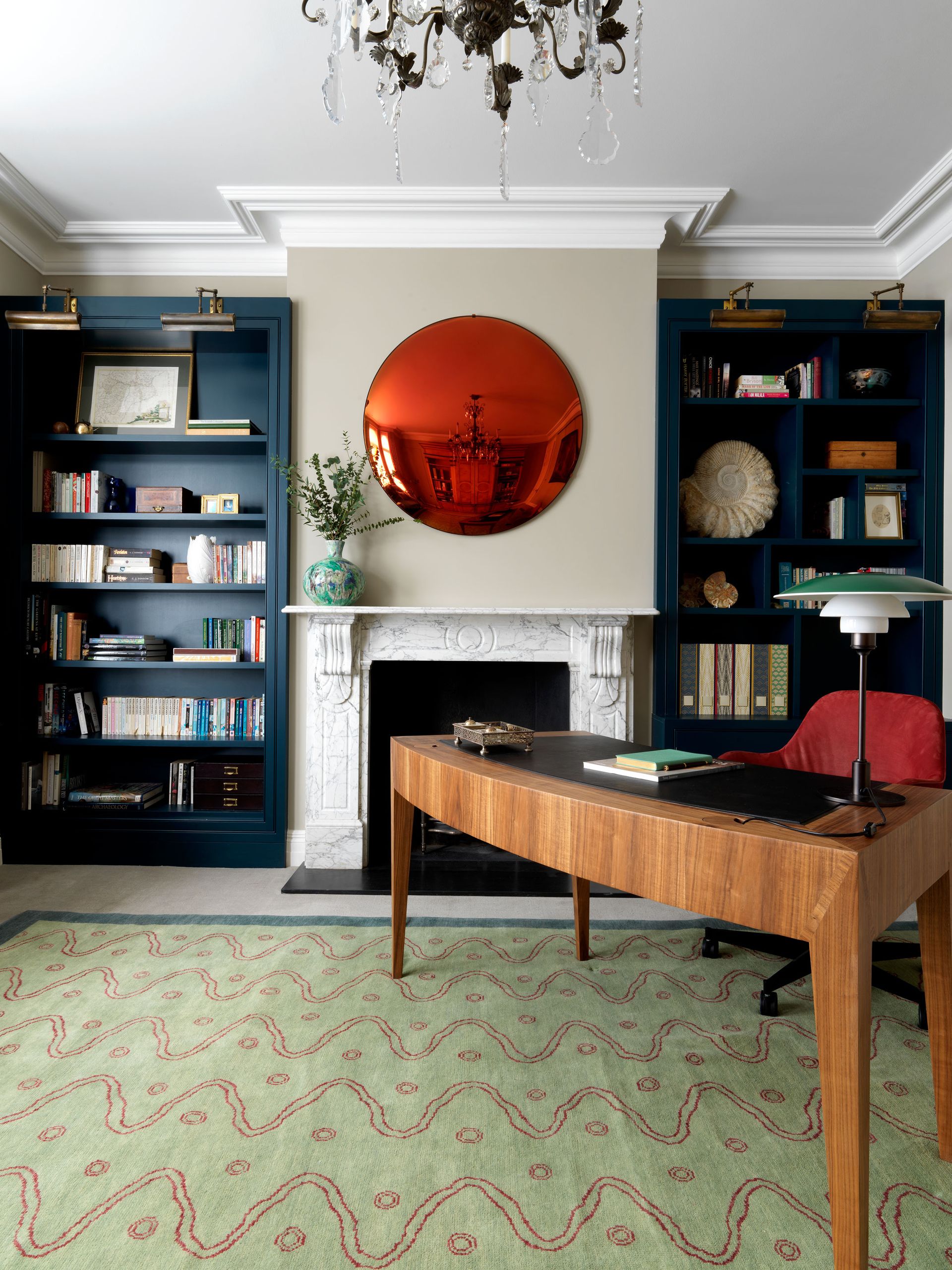
The best home office storage ideas will enable you to group smaller items together, and you might want to put them into labelled containers so they can be easily located by everyone in your home.
This is the method Pamela Meluskey and Larisa Bright, founders of luxury organization company Settled (opens in new tab) recommend. ‘Break down office items into clear categories, and label each bin or basket appropriately:
- Tech accessories (phone cases, Apple watch bands);
- Charging (phone chargers, portable battery packs) – make sure to use cord wraps to keep cords tidy;
- Audio (headphones);
- Shipping (envelopes, stamps, packing paper);
- Supplies (basic office supplies like tape, glue, scissors, etc);
- Files – sometimes it may make sense to have two file boxes: one for important documents or paperwork that’s infrequently accessed (birth certificates, marriage licenses); one for day-to-day needs (kid’s school paperwork, items to follow up on, things you need to file);
- Sentimental – offices are a great place to store sentimental items if you have the real estate. One box or bin per family member.’
Providing you've got a few desk organizers to hand, you should be able to hide this clutter with ease — and in style.
7. Suit storage to métier
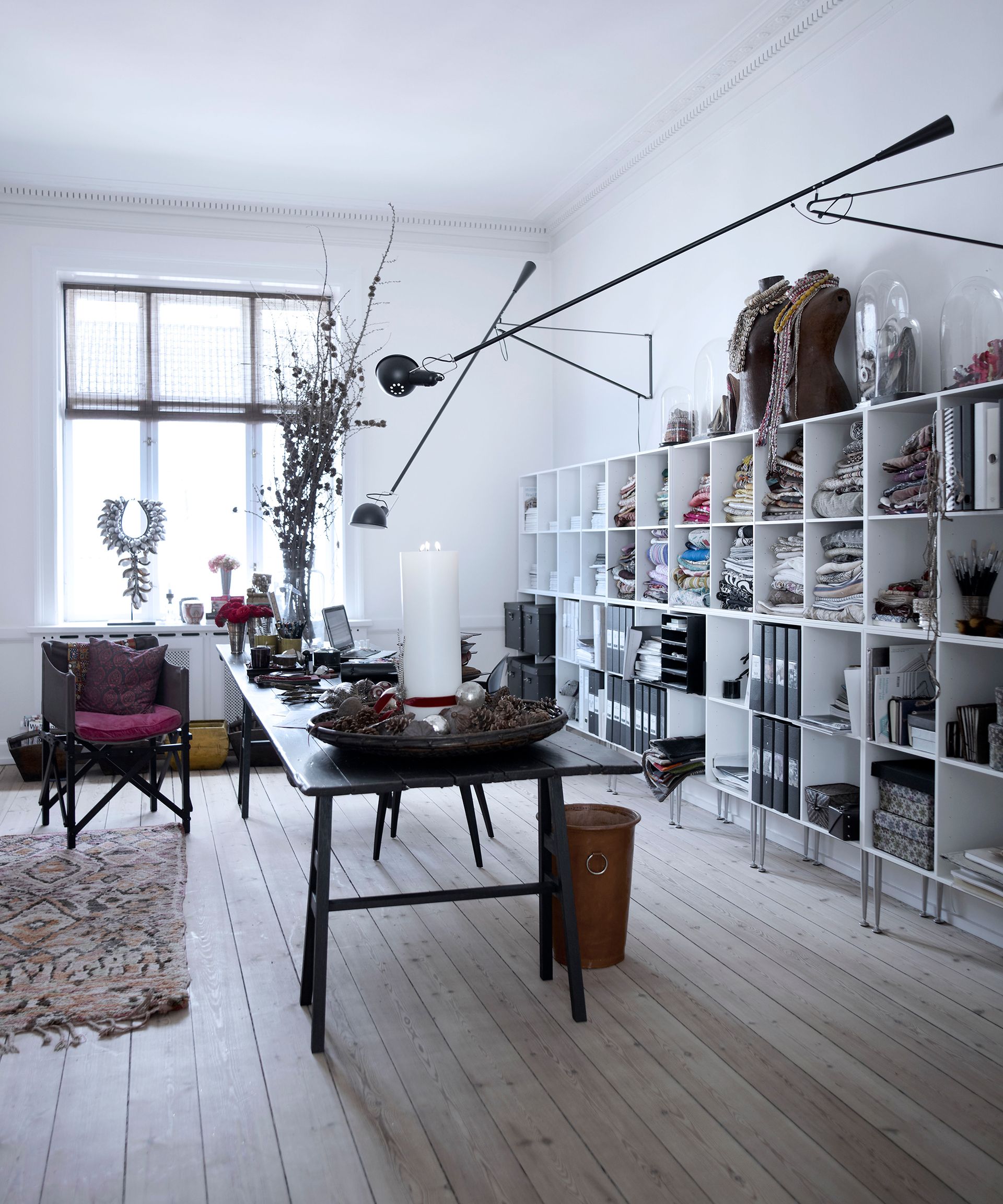
Home office storage should always be planned with the activities that take place there in mind. While closed storage or a combination of open and concealed is right for many, for some professions and interests open shelves or cubbies will be preferable.
Fabric samples and pattern books, for example, need deep and generous storage space and cubbyholes as in this room are a solution that’s practical and make the room a stimulating creative space.
Apply the same wisdom when organizing a desk – categorization and layout according to your needs will ensure the best home office productivity.
Note the home office lighting ideas in this space, too. Wall-fitted, it allows you to maximize desktop storage since it takes up no surface space.
8. Repurpose beautiful accessories as storage
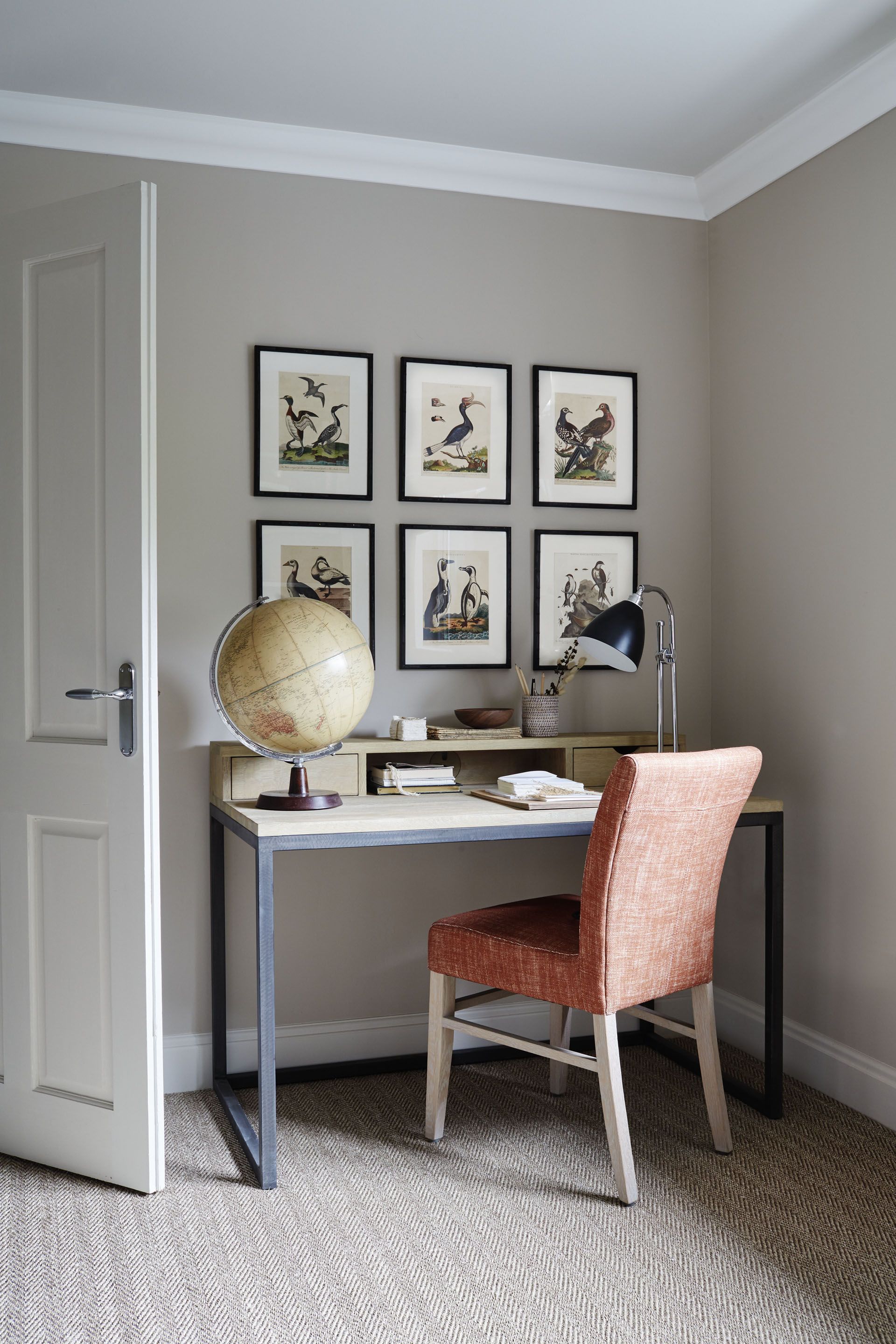
While there are elegant home office storage pieces on offer, home office storage ideas can encompass repurposing items.
‘Use something beautiful and interesting and unconventional to hold your supplies,’ suggests Kristin Kong of K Kong Designs (opens in new tab). ‘From jars and trays to teacups and tin cans, unusual or sentimental objects will provide much more creative inspiration throughout the day.
‘We also love to use baskets under a desk to conceal a multitude of things including trash bins – no one wants to see that.’
9. Be efficient in a small home office
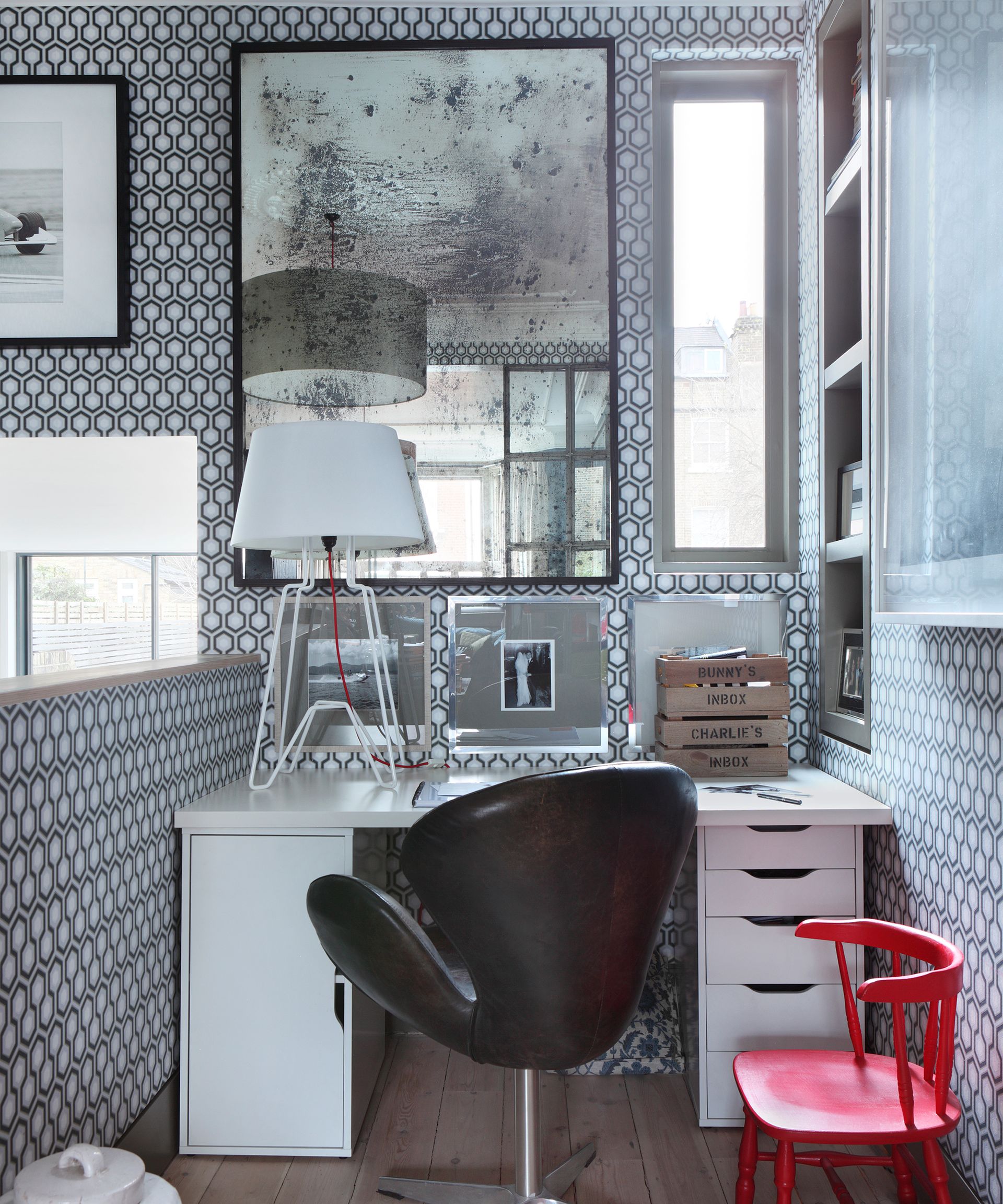
Maximize productivity in a small home office with storage that puts everything immediately to hand. ‘Consider the “in arm’s reach rule”,’ say Pamela Meluskey and Larisa Bright. ‘Everything you need to complete your work should be within arm's reach either on top of your desk or in your desk drawers.
‘For top of desk: consider a charging or docking station for extra tablets or laptops. For desk drawers: one of every office supply you need – with overflow or backstock supplies in a nearby cabinet.’
In this small office area, recessed shelving puts more office essentials nearby. In really small spaces, hidden desks, with lift-up lids for disguised home office storage are a wonderful way to furnish the space.
10. Surround yourself with home office storage
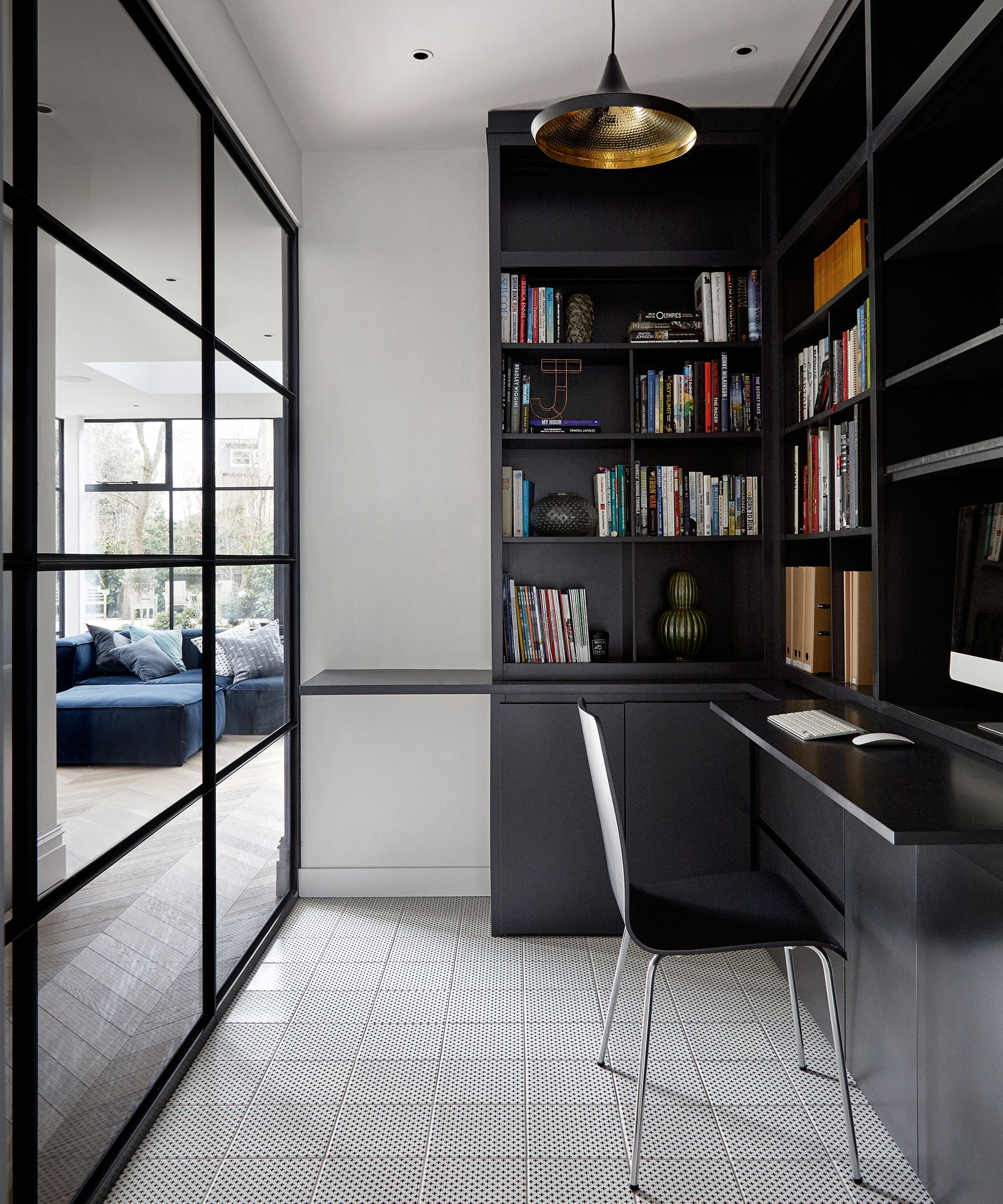
Combining home office storage with a desk can be a neat solution for small rooms and also those that are awkwardly shaped, like this narrow version. The effect is sleek, and the ambience and cocooning promoting good concentration.
Custom-built cabinetry provides the optimum amount of storage and allows the depth to be tailored to individual requirements.
How do I organize my office storage?
To organize office storage efficiently always discard before you begin as it’s easy to accumulate paperwork that’s no longer needed, out-of-date tech, and more. Shred anything confidential, and donate anything that might be useful to others.
After that it’s worth drawing up a list of exactly what you need to keep in the room – or office area – in order to make sure you include everything in your organization plan.
Think categories: from small items like stationery to larger items such as printers and scanners, so you can keep like with like. Then plan which part of the room they should go in with most-used items nearer to you.
How do I add storage to a small office?
To add storage to a small office start with the desk. If yours is just a tabletop, consider swapping to a design with drawer space. Make use of the walls, too, with shelving above the desk, as well as on any other free wall space. Consider storage furniture on wheels to boost storage further. This gives you the option to move it out of the room when you’re in there to create extra space, then put it back into the home office when you’re done for the day.

Sarah is a freelance journalist and editor. Previously executive editor of Ideal Home, she’s specialized in interiors, property and gardens for over 20 years, and covers interior design, house design, gardens, and cleaning and organizing a home for H&G. She’s written for websites, including Houzz, Channel 4’s flagship website, 4Homes, and Future’s T3; national newspapers, including The Guardian; and magazines including Future’s Country Homes & Interiors, Homebuilding & Renovating, Period Living, and Style at Home, as well as House Beautiful, Good Homes, Grand Designs, Homes & Antiques, LandLove and The English Home among others. It’s no big surprise that she likes to put what she writes about into practice, and is a serial house renovator.
-
-
 How to remove lint from clothes – and restore them to their former glory
How to remove lint from clothes – and restore them to their former gloryWe explore six expert solutions for removing lint from clothes
By Chiana Dickson • Published
-
 Will grass seed grow after a frost? Experts offer their cold weather lawn growing tips
Will grass seed grow after a frost? Experts offer their cold weather lawn growing tipsAvoid disappointment and costly mistakes by learning whether grass seed will grow after a frost, plus what you should do to protect it
By Jill Morgan • Published
